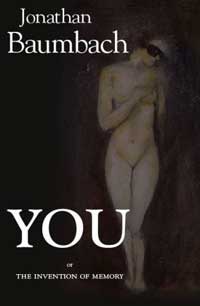You

How does one wake up every day with a strong imperative to look for some strand of meaning from the frayed reality that relentlessly presents itself to our punch-drunk (collective and perhaps individual) consciousnesses? Wait, don’t answer that.
My guess: by partially fashioning one’s own narrative with usable and reliable axiological tools. Anyway, I am much impressed with what freelance book missionary Lauren Cerand has done in her commitment to advancing the readership for Jonathan Baumbach’s (author of 15 previous books) overlooked 2007 novel You: Or The Invention of Memory (Rager Media). In a lucid, eloquent, informative, and admirable memoir/memo she explains something about the book publishing business, how she came to know Baumbach, and what she intends in helping publicize You:
I will be writing about the campaign, and its progress (and whatever else happens, good, bad and especially unexpected) here, and I’d like to be as interactive as possible… Whatever it is, whatever you want this space to be, I’m into it and I’m into you, and I believe you’ll be into YOU, too.
Baumbach’s tome, by the way, is a postmodernist narrative in which the Narrator—who may or may not be the author—weaves a story of an inconclusive relationship with a woman referred to only as “you.” It begins:
And ends:
You
Uh, huh.
